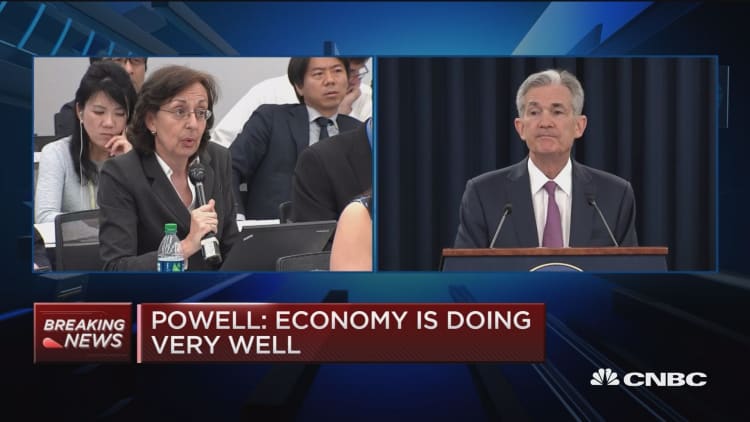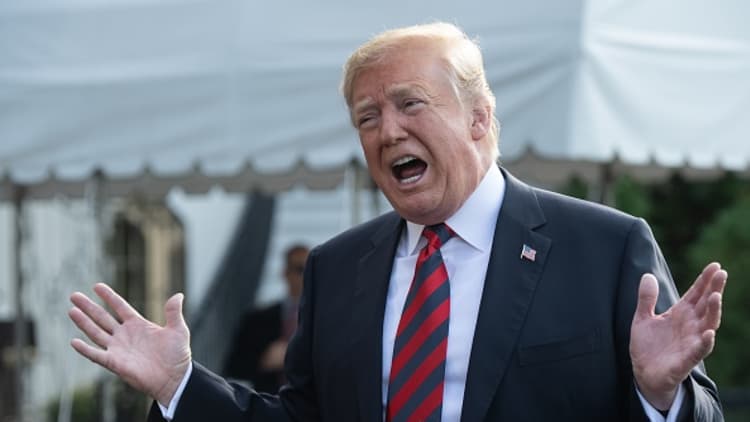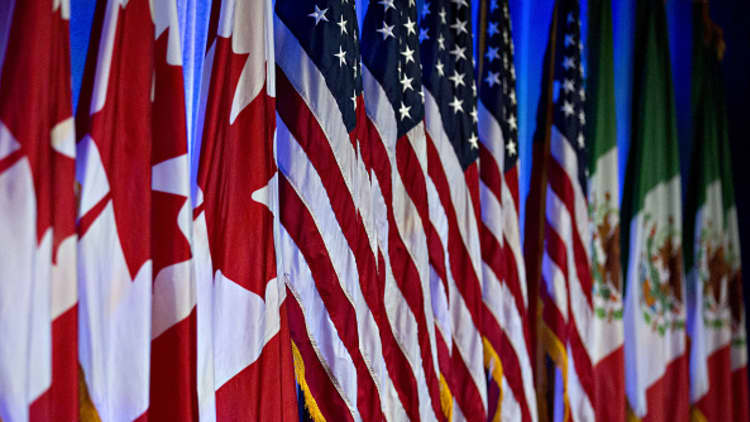U.S. trade relations appear to be hitting rock bottom ahead of potential new tariffs on China Friday and amid continuing worries that President Donald Trump will shred the North American Free Trade Agreement with Canada and Mexico.
Trump's already testy meeting with leaders of major trade partners at the G-7 summit last weekend took an even more difficult turn when he and administration officials slammed Canadian Prime Minister Justin Trudeau. Trudeau had commented that Canada would not be pushed around by the U.S. and that it would proceed with retaliatory tariffs, drawing criticism from Trump and other officials who said Trudeau was stabbing Trump in the back.
The new low in U.S.-Canada relations fed concerns that NAFTA talks, still far from settled, could either drag on even longer or fall apart altogether, leading to Trump withdrawing from the 24-year-old trade pact.
Trump trade advisor Peter Navarro appeared to be toning down the administration's rhetoric Tuesday when he apologized for insulting Trudeau by saying there was a special place in hell for him. Navarro also said the list of proposed tariffs on Chinese goods, expected to be announced Friday, will be smaller than the original list.

"The original list was $12.5 billion of tariffs on $50 billion of goods (0.06% of US GDP) and making the list smaller is positive on the margin," wrote Dan Clifton, head of policy research at Strategas. "The initial round of tariffs is quite manageable economically although we are moving to a more uncomfortable stage should the tariffs be imposed."
China has threatened its own tariffs, as have other trading partners the Trump administration has targeted. Progress appeared to be made when the White House struck a deal to allow China's ZTE to resume buying U.S. components even though it violated sanctions against selling to Iran and North Korea. However, the deal now is in question, with the Senate attempting to undo it with a bill that is making progress.
"That is a cornerstone of what President Trump promised President Xi," said Juan Carlos Hartasanchez, senior director with Albright Stonebridge Group. "I think for the Chinese, they just look at these guys and say they are not aligned. They don't have a direct message and that is likely something that debilitates the U.S. in the eyes of the Chinese."
Hartasanchez, who follows NAFTA, said it would help the NAFTA discussions, though maybe not the outcome, if the U.S. were to find a way to settle its disputes with China.
"They have opened too many fronts in battles against the main trading partners. They opened a front with China, they have the NAFTA front, and they opened a battle with Europe. It doesn't allow you to measure the effect of one negotiation on the others," he said.
Political and trade strategists say the fate of NAFTA is more unclear after G-7, and it is now more difficult than ever to handicap the odds of a new agreement. "Does [Trump] come home from Singapore and say: 'I'm out of NAFTA, I'm done?' ... I don't know,'" Clifton said.
"I think the weekend's events escalated the risk of trade wars," he said. Clifton said Trump believed Canada was in the wrong and tariffs righted the wrong, but he could see Canada's retaliation as a new escalation and could therefore respond.
Trump on Monday said Trudeau's comments will cost Canada "a lot of money." Although Canada is the country feeling the main brunt of U.S. tariffs, its goods deficit is relatively small compared with that of China or even Mexico. And with services exports, there is a trade surplus of $8 billion in the U.S. favor.
"I think as far as we know the NAFTA renegotiations are still there on the table and no one has announced they're pulling out," said Patrick Leblond, a senior fellow at the Centre for International Governance Innovation in Ontario, Canada. "It's also interesting in this whole kerfuffle ... that Lighthizer, the U.S. trade representative, has not said anything."

U.S. Trade Representative Robert Lighthizer reportedly spoke Sunday with Canadian Foreign Minister Chrystia Freeland after Navarro's comments and is expected to meet with her while she is in Washington this week, according to The Wall Street Journal.
"If [Trump] thought putting tariffs on Mexico and Canada would give him leverage, it backfired," Leblond said. Trump's posture toward Trudeau has not helped, he said.
"Even if he threatens to withdraw [from NAFTA] or invokes article 2205 and notifies that he intends to leave, I think both Canada and Mexico would say, 'Go ahead, try your luck,'" Leblond said, referring to a provision in the NAFTA agreement. "We'll see how the U.S. political system works and what happens, whether you'll be able to do that."
"Certainly from the Canada side, we're bracing for a fight. It's pure bullying, and we're going to fight back," he said. "With Congress, Canada has done a lot of lobbying and engagement and that will continue."
Leblond said some trade lawyers believe Trump does not have authority to exit NAFTA without congressional approval since it put the trade act into law. Business leaders, trade groups and many members of Congress oppose leaving the trade agreement, which has spawned a web of interrelated industries and supply chains across all three countries.
"Congress could try to challenge Trump's authority," Leblond said. "I could see this mired in the courts for quite a while." He said it could ultimately be decided by the Supreme Court.
Clifton also expects a bitter fight if Trump attempts to withdraw.
"We believe there would be a private lawsuit, and we believe congressional leadership would sign on to that private lawsuit, and the lawsuit would say the president doesn't have the authority to pull out of NAFTA," he said. "That's one school of thought." He said the suit could be brought by a business group or association.
Hartasanchez said even with the six-month period that would pass after a withdrawal from NAFTA is announced, it could still be in effect because of the anticipated legal challenges.
"Everything is related. Mexico had nothing to do with G-7, but now given Canada's decision as a host of G-7, it has put Mexico in a difficult position with NAFTA," said Hartasanchez.
Aside from NAFTA, trade experts say another concern is the possibility Trump could impose tariffs on imported cars. The administration is investigating whether it should do so on the grounds of national security. Congress is attempting to push legislation that would block Trump from using national security as a reason for tariffs without congressional approval, but it's not seen as having much chance.
According to the Peterson Institute, 187,000 U.S. jobs could be lost if the U.S. withdraws from NAFTA, over a one- to three-year period, and even more if the U.S. drops out of the Canada- United States Free Trade Agreement.
If the U.S. leaves NAFTA, Mexico and Canada would remain in it unless they also withdrew.
WATCH: Former Honeywell CEO on NAFTA



